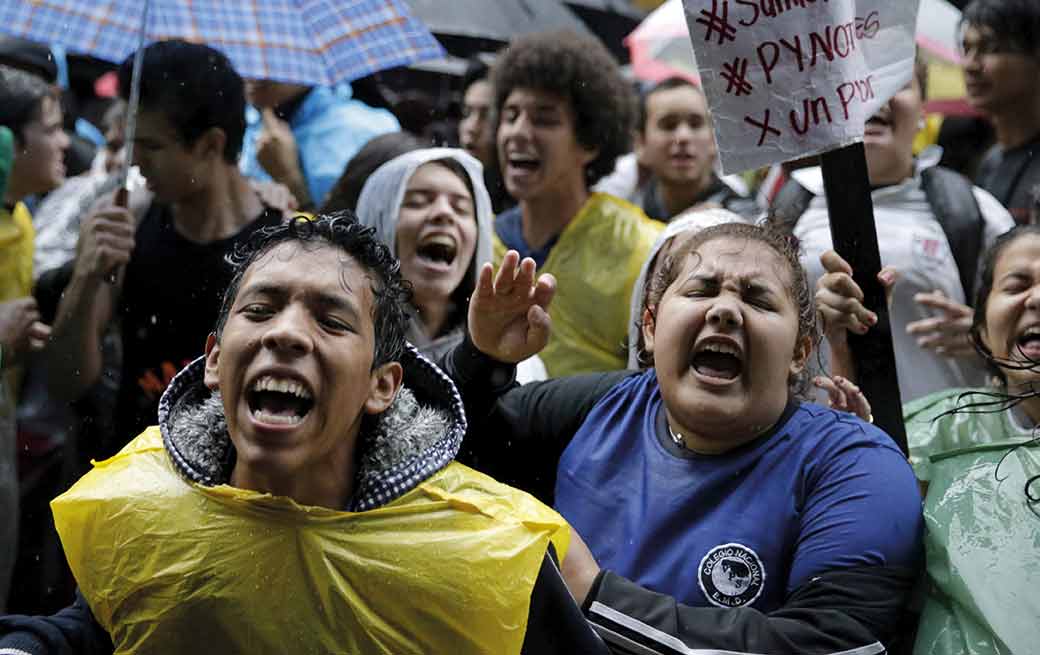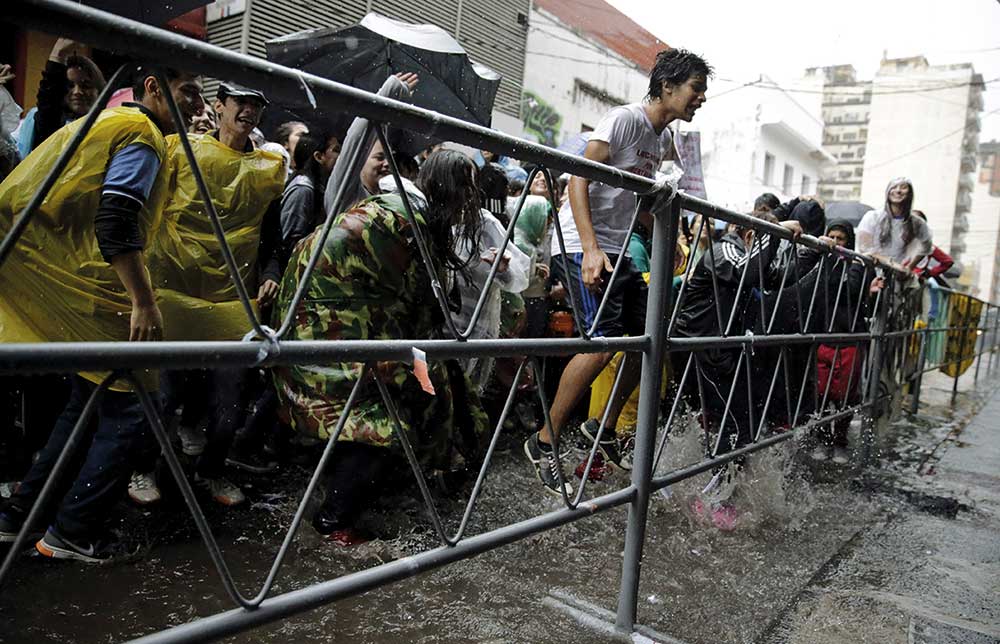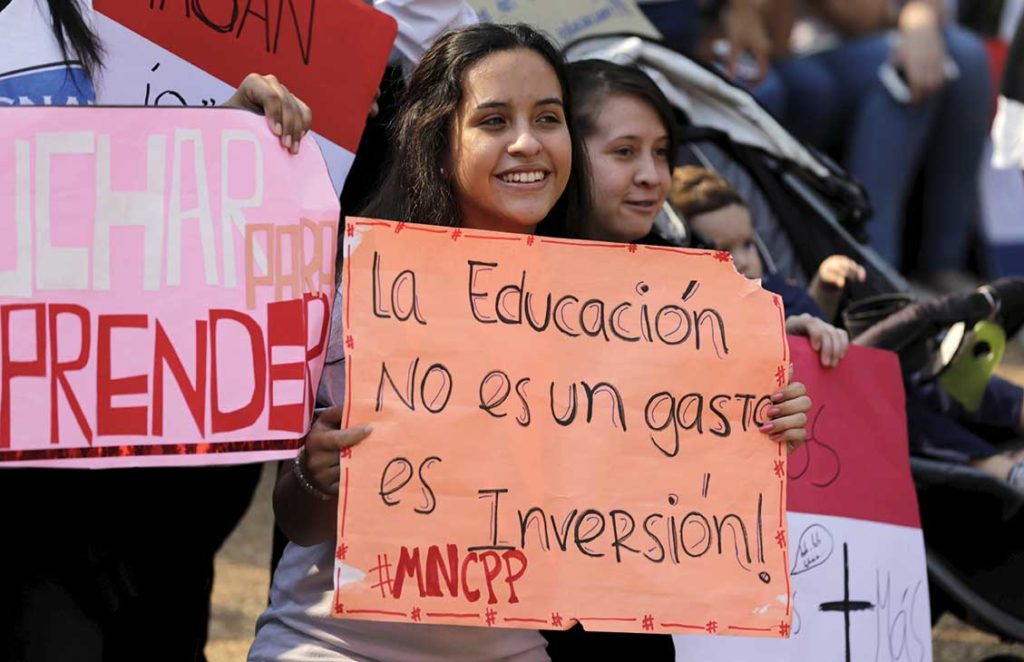We are living a historic time in our country. The protagonists: the young people! This is no small thing. They are undermining the rotten structures of corruption in education. It all started with a sit-in by high school students from a school run by the Jesuits. The request was very unspecific: a better education. This form of protest became generalized in other public and private schools and culminated in a call for a big march.
At the same time, the newspaper Last Minute published a news item reporting that the rector of the National University of Asunción (UNA), Froilán Peralta, charged twenty million guaraníes for professorships that he did not teach. The newspaper also reported a series of fraudulent appointments made by the rector. The scandal did not go unchallenged. On September 18, the president of the nation signed the law that obliges to regulate all public information. Thus, the salaries of public officials, among them the teachers of the UNA, appeared on the Internet.
On that day, there was a large protest by hundreds of students from public and private schools with the slogan Paraguay does not shut upThe slogan that would give name to the student movement. At night, the university students presented themselves in front of the rector's office of the UNA to demand the resignation of the rector. A series of demonstrations began, which at first gathered hundreds of university students, but eventually mobilized thousands of students who took over the university in a peaceful manner. The media supported this mobilization from the beginning.


In addition, other economic mismanagement in other faculties became known. The students denounced these irregularities and demanded accountability. They demanded the resignation of the deans found to have committed acts of corruption and the dismissal of the Board of Directors. A three-week vigil was held.
In the meantime, the prosecutor's office intervened, at first slowly due to political interests. The university students exerted pressure and closely monitored the steps taken by the prosecutors. At the beginning, the rector was found guilty and was prosecuted and imprisoned for breach of trust. The other authorities and officials who resigned also had their "dirty laundry". More than one hundred people in charge of various University agencies were charged.
High school students continued with their protest. The situation was complicated by the collapse of the roof of a public school. Fourteen students were injured. In addition, other irregularities were discovered, such as the non-delivery of school kits. A new protest march took place and the Minister of Education agreed to meet with the high school student leaders. However, she did not give an answer to the students' demands: school ticket, student kit, school snack, teacher training (it is found that many teachers do not have the necessary accreditations to teach). Finally, they demanded the use of 7 % of the GDP in education, as stated in the Constitution. It was believed that until then only 3.5 % had been spent, then it was found that even less had been spent, only 2.3 %. The high school students agreed to a meeting with the president, who also failed to give the expected response. Demonstrations followed until they finally got what they wanted. For their part, the university students demanded a change in the university statute, since it was so ambiguous that it allowed mismanagement of the budget.
Little by little, the students of the UNA are achieving their objectives. They succeeded in having the dean of the Polytechnic faculty, Abel Bernal Castillo, appointed interim rector. Of the fifteen deans of the university, he was the only one trusted by the students. Together with the students, the new rector has taken a series of measures in the required direction. It is something transcendental in the country: today, with transparency, it is possible to know exactly the situation of each one.
The motto is #UNA don't shut up. Someone said that this event is, for our country, almost as important as the fall of the Berlin Wall for the communist countries. We spoke with Mauricio Portillo, 5th year veterinary student and president of the Student Center.


How did it all start?
-He started with the sentata of the high school students. In Veterinaria we started to demonstrate on the same 18th, after the students' march. From there we went to demonstrate in front of the Rectorate. The one who was rector was dean of our faculty for 21 years. There was a lot of corruption, diversion of money, he had his people, and whoever opposed him was excluded. Some students who demonstrated against them could not finish their studies there and had to go to a private university. There was talk of a reign of terror (he was protected by an influential politician). The professors who were against the rector were afraid.
First we were the veterinary students and then we called those from other faculties who were involved in the cause. At the beginning we were about two hundred students, then many more joined us. From then on we called a vigil that lasted three weeks. There were representatives from each faculty. Almost all the faculties joined the cause, except for three faculties considered the most corrupt.
I stayed almost 20 days sleeping in the faculty under tents. It was necessary to keep watch to prevent the burning of documents. Then we waited for the prosecutor's office to come and take the documents (there was not much confidence in the performance of the members of the government).
Then came the domino effect....
-Yes. Corruption started to break out in the different faculties. Students demanded the resignation of the dean and the entire Board of Trustees. In Veterinaria, many members of the Board of Directors resigned in addition to the dean.
Was there good coordination among the students?
-Every day, the ten representatives from each faculty met.
How were acts of violence prevented?
-We came to the conclusion that the people who were there were the civilized ones. Then there were infiltrators but they were identified and under observation. The logistics were very good, the food was distributed to all the security posts, the page #UNA don't shut up reported hourly and a digital university newspaper from the law school updated the news.
Did you expect this success?
-We were confident because we had a lot at stake. The situation in the classrooms was very tense. In the last few weeks, some students were warned not to talk to me, because I shared my ideas on social networks. I didn't know if I could talk to some classmates.
The prosecution must now be trusted.
-Yes. In any case, there is a copy of everything the prosecutors took at the National Computer Center, which is at the University. Besides, there is a group of students who are following the whole process. What we are waiting for is that the new directors are of our confidence. There are few people who are not part of the system.
So far, what have they achieved?
-There is now a person in charge of the office who is trusted. In 60 days there will be elections for the new Board of Directors. Many of them are accused. Other countries in South America are waiting for what will be achieved, because in their countries they also have a lot of corruption at the level of education. By fighting for their rights we can achieve our goals.
Fabrizio Ayala is a high school senior at San José High School.
How did the mobilization of high school students begin?
-Secondary movement was the beginning of the movement Paraguay does not shut up. It began with the sentata of the students of the Jesuit Colegio Cristo Rey, advised by FENAES and UNEPY, two student organizations. They, the students of the national schools, were already accustomed to protest because they are the ones who suffer the most. We have a roof, housing, food, but they do not have it so easy.
In the meetings between students from different schools we decided to demand six points: the student ticket, the school kit, lunch and snack, a structure for schools, increased investment in education and improved teacher training. While the marches were taking place, school roofs were falling down, school kits were not being distributed and corruption was rampant. At one point there was some fear.
Ultimately, our motivation was the belief that the basis for development is health and education.












